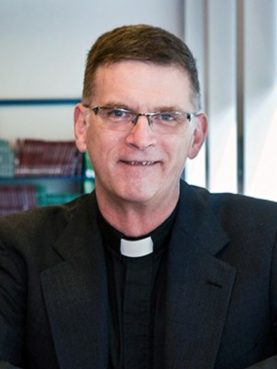(RNS) — On Sunday, millions of Americans will gather with friends to eat snacks, laugh at the latest TV commercials and watch a little football as the Kansas City Chiefs take on the San Francisco 49ers in Super Bowl LVIII.
More than a few will place bets, often on their cellphones.
Americans are expected to bet $1.3 billion on the big game, according to online gaming industry news site Legal Sports Report, thanks to the explosive growth of legalized sports gambling, which has spread to nearly 40 states.
RELATED: Sports and Ministry: Insights Into an Interesting Balancing Act
But not to Alabama or Texas, who are among the holdouts, and where faith leaders in particular have been working to keep legal sports betting out.
Greg Davis. (Photo courtesy Alabama Citizens Action Program)
For Greg Davis, a Baptist pastor and president of the Alabama Citizens Action Program, that has meant opposing any changes to the state’s constitution, which bans lotteries and most forms of gambling. Davis said he knows that people bet informally on sports in Alabama.
But those wagers are relatively low-stakes, he said, compared to industrial-strength sports gambling. Davis said he and other faith leaders in Alabama believe sports gambling is harmful and addictive. They object to the idea of the state profiting off the gambling losses of Alabama’s citizens.
“We don’t think the state government should be in business with corporate gaming to prey on its own people,” he said.
Some of the nation’s largest faith groups have long considered gambling immoral, or a “menace to society,” as the United Methodist Church social principles put it. But faith leaders like Davis are likely fighting an uphill battle, said longtime Boston College professor and Jesuit priest Richard McGowan.
McGowan, who has been nicknamed “the Odds Father” because of his research on gambling, said faith leaders were caught flatfooted by how fast legalized sports gambling became commonplace.
After New Hampshire started the first state-run lottery in 1964, he said, it took nearly 60 years for 40 other states to follow suit. Legalized sports betting took five years to get that popular — after the Supreme Court struck down a 1992 federal law that limited legal sports betting to Nevada.
Instead of having to jet off to Las Vegas to place a legal bet, in most states, people can pull out their phones and use a popular app like Fan Duel or Caesar Sportsbook to place bets on the outcomes of games along with almost anything else that happens in a game.

The Rev. Richard McGowan. (Photo courtesy Boston College)
The ease of legalized betting coincided with what McGowan called “the ethics of tolerance.”
“The ethical theory a lot of people go by is you should be able to do what you want as long as you don’t harm somebody else,” he said. That makes it hard to argue against activities like gambling, which many people see as harmless entertainment but can have harmful side effects when people become addicted.
The states that have legalized gambling, he said, also see gambling as a pain-free source of revenue, which is then used for popular social causes like funding college scholarships. That also makes it hard to raise ethical questions about gambling.
“People have been doing it for years and years and years illegally, and now the government is basically saying, all right, it’s fine to do it legally, and by the way, we’ll make lots of money,” said McGowan.


